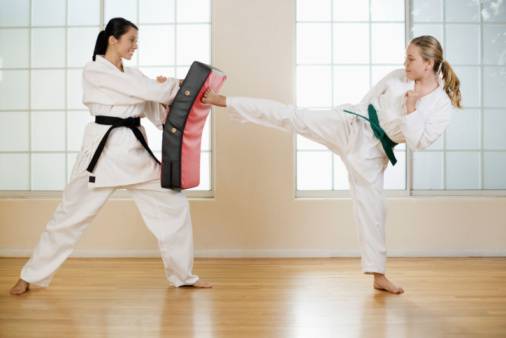
What is Karate?
Karate is a Japanese martial art whose physical aspects seek the development of defensive and counterattacking body movements. The themes of traditional karate training are fighting and self-defense, though its mental and moral aspects targets the overall improvement of the individual. This is facilitated by the discipline and persistent effort required in training. If karate had to be described in only one sentence, then the most suitable one may arguably be “You never attack first in karate.” This is a maxim of Gichin Funakoshi (1868-1957), the Okinawan who brought karate to Japan in 1922, and who is accepted as the father of modern karate.
The word karate is a combination of two kanji (Chinese characters): kara, meaning empty, and te, meaning hand; thus, karate means “empty hand.” Adding the suffix “-dō” (pronounced “daw”), meaning “the way/path,” karate-dō, implies karate as a total way of life that goes well beyond the self-defense applications. In traditional karate-dō, one is supposed to compete and strive to excel against him/herself.
Today there are four main styles of karate in Japan: Shotokan, Goju-ryu, Shito-ryu, and Wado-ryu. Shotokan, though never described as a style by Gichin Funakoshi, it has been nevertheless considered as his. Actually, Shotokan was the name of his dōjo, chosen after the pen name used by Funakoshi to sign poems written in his youth. Shotokan Karate is characterized by powerful linear techniques and deep strong stances. It is the style taught at the Tulane Karate Club.
Like the word karate, Shotokan is also composed of two different kanji : Shoto, meaning “pine breeze” and kan, meaning “the place”, thus Shotokan means the place of shoto.
Benefits of Karate
From a self-defence perspective, all research indicates that during the real-life confrontation, the body undergoes a PCSR (Psycho-Chemical Stress Response). When this occurs, the ability to access logical thoughts all but diminishes. Instead, under the conditions of PCSR, the human brain accesses what is referred to as the ‘Primal Brain’, which control instinctive behavior. So what does this all mean? Unlike self-defense courses that show a person, a set of logical defenses against a potential attacker (none of which become instinctive) karate training sets out to develop appropriate ‘instinctive‘ habits in its participants. This gives them the ability to act accordingly under conditions of a PCSR.
Fitness, Energy And Vitality
From a fitness perspective, the techniques practiced by White belts each class involve the use of every muscle and bone in the body making it an excellent all-over body workout. Involving the entire body also serves to develop balance, agility, coordination, and flexibility. Many students who have never been good at regular sports often become highly competent in other sports after training in karate.
Instilling Family And Success Values
While it is a system of self-defence and all-encompassing body workout, karate also promotes values congruent with the family unit and success. It is an environment that promotes respect and courtesy. It teaches a student to become more disciplined, more patient within themselves, and encourages humility above ego.
The dojo environment does not tolerate foul language or negative social behavior. In short, it is a place where each participant can be their very best selves. The ultimate goal is that people then take this behavior and apply it to their everyday lives; at home, work and/or school.
Character Development
In most sports, you win or you lose. As karate is an individual activity there is no losing, nor is there any pressure of ‘letting the team down’. As such, a student may focus on developing at his or her own pace. And seeing themselves getting better, more skilled, fitter, stronger, more coordinated etc, week-after-week, their self-confidence grows.
Classes can be as hard as you allow them to be. Students can ease off if they are not in peak shape, but an instructor will regularly promote that a person pushes themselves just outside their comfort zone before easing off. By constantly breaking pre-conceived mental and physical barriers, a student will learn the power of persistence and come to realize that whatever they set their sights on, they can achieve – a valuable skill for life.
Where Can You Get Karate Training?
Krishna Sports Academy is your Destination for Excellent Training sessions.
Call Now for free Demo Classes: +91-8800484985
